- The Best Time of Day to Drink Bone Broth to Maximize Health Benefits
- 8 Ways to Increase Dopamine Naturally
- 7 Best Breads for Maintaining Stable Blood Sugar
- Gelatin vs. Collagen: Which is Best for Skin, Nails, and Joints?
- The Long-Term Effects of Daily Turmeric Supplements on Liver Health
- Could Your Grocery Store Meat Be Causing Recurring UTIs?
- Are You Making This Expensive Thermostat Error This Winter?
- Recognizing the Signs of Hypothyroidism
- 10 Strategies to Overcome Insomnia
- Could Artificial Sweeteners Be Aging the Brain Faster?
Ultrasound Trumps CT Scan for Diagnosing Kidney Stones in Study


When diagnosing kidney stones, using ultrasound instead of CT scans reduces costs as well as patients’ exposure to radiation, according to new research.
A separate study also found that people with type 2 diabetes who maintain tight blood sugar control can lower their risk for developing kidney stones — small, solid deposits that form in the kidneys.
“Enhancing patient safety and lowering incidence of disease in higher-risk patients are major priorities within the medical community,” said Dr. Margaret Pearle, professor of urology at the University of Texas Southwestern Medical Center in Dallas. “Understanding how to prevent kidney stones combined with further evaluation of the methods used to detect and treat them can only increase the quality of care we strive to deliver patients every day,” she said in an American Urological Association news release.
When kidney stones are suspected during an emergency room visit, patients usually undergo imaging to rule out other conditions and confirm the diagnosis. Although use of CT scans has risen, data compiled from 15 U.S. medical centers revealed that when it comes to patient results, CT scans are no better than ultrasound, the researchers found.
The study involved nearly 2,700 patients, ranging in age from 18 to 75 years. The patients who had symptoms of kidney stones were randomly assigned to receive either an ultrasound or a CT scan as their first diagnostic test. The researchers also examined the number of serious negative events that occurred within 30 days and the number of patients who returned to the emergency room or were hospitalized.
No significant differences emerged in terms of adverse events. Of the patients examined, about 11 percent who had a CT scan experienced a serious negative event, compared to about 12 percent who received an ultrasound from an emergency room doctor. Negative events also affected nearly 11 percent of the patients who had an ultrasound performed by a radiologist.
The researchers also compared patients’ overall radiation exposure and the costs of imaging tests over a six-month period.
The study found that CT scans exposed patients to much more radiation than ultrasound, potentially raising cancer risk. CT scans were also more expensive, averaging $300 versus $150 for ultrasound performed by an emergency room physician and $200 for ultrasound done by a radiologist.
The study was presented at the annual meeting of the American Urological Association, which concluded Wednesday in Orlando, Fla.
Meanwhile, a separate study conducted by researchers at the Cleveland Clinic in Ohio found that people with type 2 diabetes who maintained normal blood sugar levels were at lower risk for developing kidney stones than those who did not keep their blood sugar levels in check.
In conducting the retrospective study, researchers examined information on 1,831 patients with type 2 diabetes who also had kidney stones. Factors they considered included participants’ age, gender, medications, and whether or not they used insulin.
Based on their medication, the participants were divided into two groups: the insulin group and the diabetes pill group. The study found that insulin injection therapy — which is needed in more severe cases of diabetes — is linked with higher levels of acid in the urine than diabetes medications. Therefore, the researchers said, managing diabetes and keeping blood sugar levels within normal levels can lower the risk for kidney stones.
Studies presented at meetings are typically considered preliminary until published in a peer-reviewed medical journal.
More information
The U.S. National Institute of Diabetes and Digestive and Kidney Diseases provides more information on kidney stones and their diagnosis.
Source: HealthDay
Copyright © 2026 HealthDay. All rights reserved.










